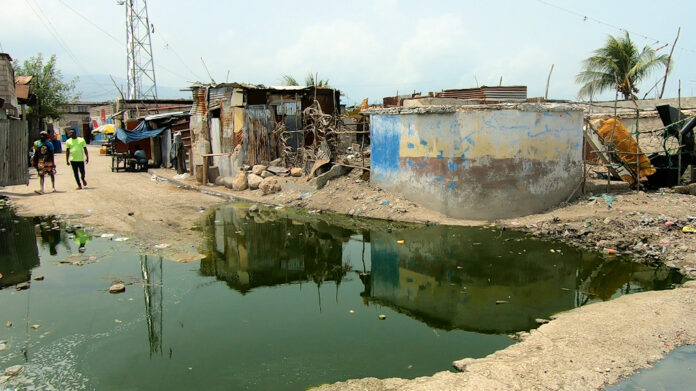
Most of Haiti’s traditional politicians have taken completely erroneous positions on how to deal with the dramatic insecurity problem that now grips the nation. Their solutions all generally revolve around one sinister proposal: to strengthen the police, or even go so far as to build many more prisons.
This political class does not live in the real world. The privileged class position of Haiti’s politicians means that their thinking aligns with imperialism’s ruthless logic, which dismisses the plight of our citizens without any future. Instead of resorting to repressive solutions, which will only make matters worse, we must look at the root of the problem, touch the gaping wound to remove the infection, and ask precisely how we got to this stage of deterioration.
Just as they did in 2003 when working to destabilize the government of President Jean-Bertrand Aristide, certain Haitian politicians and intellectuals (many of whom are the same that we see holding forth today) accused the Lavalas government of creating the chimères, as the mobilized youths of Haiti’s underclass were then called. Today, they have resorted to the same formula, the same charges without foundation, accusing the Jovenel Moïse government of federating the Revolutionary Forces of the G9 Family and Allies, Mess with One, You Mess with All. This slander just hides the real motive forces behind the lumpen-proletariat’s mobilization, which is accelerating, and inflames the situation, fueling the total chaos in which we are now living.
The bourgeois opposition’s demagogic statements, proposals, and actions cannot solve the problem. On the contrary, they make matters worse.

From 2004 until today, almost two decades later, the Haitian political class has not changed its tactics. It uses the same tools of yesteryear to create confusion and induce the naive into error. They don’t denounce the current capitalist economic and political model, based on Washington’s neoliberal policies, which has slowly destroyed Haiti’s economy. These policies have crushed national production, uprooted the peasantry, driven millions off the land and into crowded slums, where they live in horrendous conditions without jobs, food, services, or hope. Instead of pointing their finger at our main enemy – the capitalist system and its subservient local bourgeoisie – our politicians, human rights groups, and some journalists point to the enemy’s victims – millions of shantytown dwellers and their organizations – as the source of all our problems.
The “American Plan,” as we used to call it in the 1980s when launched under the global right-wing offensive led by Margaret Thatcher and Ronald Reagan, has almost reached its final objective: to completely destroy Haiti’s economy and sovereignty. Washington has patiently orchestrated the monumental failure of our society. However, our political class, subservient to American interests and greedy for its bribes and rewards, has made no effort to recognize or denounce the structural adjustment policy that has brought about Haiti’s complete destabilization today.
The percentage of unemployed poor and young executives looking for jobs has reached its dizzying zenith, and, as a result, the population is getting poorer every day. Imagine if Aristide had been able to prevent, as he tried, the privatization of the state enterprises, which were then often shut down completely. The state would have been able to hire thousands to make essential oils, cement, and flour, fix telephone lines, or repair electric plants around the country, creating jobs, goods, and services. Today, all these sectors are either smashed or in the hands of foreign corporations or our greedy bourgeoisie, who have no qualms at making millions off the backs of the impoverished.
This somber tableau is the result of our politicians’ allegiance to the “laboratory”
With half of our population under the age of 25, most Haitians are able and anxious to work, but they can find nothing to do. There has never been a strong state policy to fight for workers’ interests, either in salaries, benefits, unions, or work conditions. Even the timid attempts made under Aristide and Préval were largely beaten back by the U.S. State Department, as we revealed in the secret diplomatic cables which Wikileaks gave Haiti Liberté in 2011.
Imagine if the Haitian state would simply raise taxes and duties on our super-rich bourgeoisie to pay to fix our decrepit roads, unclog our choked, overflowing canals, and provide schools, hospitals, sanitation, housing, and internet for the poor to live decently. Instead, we see scenes like what just happened under the Del Rio bridge in Texas, and similar expressions of our nation’s desperation will happen again somewhere soon.
Our comprador bourgeoisie no longer even engages in import-export. It is all import, with just a trickle going out from the ever-ailing assembly industries. Even there, only the labor comes from and stays in Haiti.
Agricultural production and development have shrunken dramatically. The anti-national bourgeoisie has only sold off entire sections of the economy and national resources to foreign capital, which only envisages destructive, polluting activities like gold-mining.
This somber tableau is the result of our politicians’ allegiance to the “laboratory,” as Aristide used to call it. The traditional political class serves capitalist interests, which are antithetical to workers’ or peasants’ interests and popular democracy. The suited delegations which file into certain embassies are only humiliating ceremonies of allegiance to the principle of imperialist interference against our national sovereignty.
The irony of today’s situation was captured in a Nov. 1 tweet by Luis Moreno, the U.S. chargé d’affaires who orchestrated President Aristide’s kidnapping in 2004.
“Haiti is literally being held hostage by a gang leader,” he wrote, referring to Jimmy “Barbecue” Cherizier. “He has more ‘soldiers,’ better weapons, and controls a large swath of the capital. As distasteful as it is, the resulting humanitarian, security, and emigration crisis will force the International Community’s hand.”

In other words, he is proposing that the U.S. and its vassals will have to invade Haiti for a seventh time to crush Cherizier and his FRG9 in order to resolve a “crisis” that threatens their interests and local allies.
Meanwhile, Washington is not threatened at all by the talk of “rupture” coming from certain sectors of Haiti’s liberal bourgeoisie and petit bourgeoisie.
What transitional “rupture” and “Haitian-led solution” are they talking about if the final decision about Haiti’s destiny rests in the hands of the United States of America? This is nonsense, but the bourgeoisie knowingly maintains the ambiguity of the “rupture,” which serves as a deceptive argument to hide its contempt for the Haitian cause.
We must put an end to this myth, which is very well maintained by capitalism’s supporters. The day that Haiti’s working-class fully understands that foreign capitalist power will not liberate us, but only further impoverish and enslave us, the victory will be near. The struggle for a new Haiti will then go through a true rupture, that of severing all allegiance to imperialism and its institutions. We will rebuild the nation with the force, resources, and genius of our 16 million compatriots, including the diaspora, just as our founding father Jean-Jacques Dessalines had envisaged.









